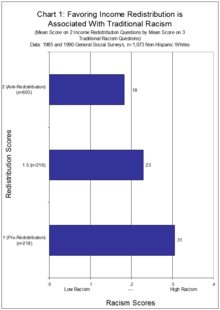Last week I posted several times on the charitable donation patterns of redistributionists, the subject of one chapter in the book Who Really Cares and a peripheral issue in a paper of mine, Testing Social Dominance: Is Support for Capitalism and Opposition to Income Redistribution Driven by Racism and Intolerance?
This week I will describe some of the main ideas in my paper on the attitudes of income redistributionists and anti-capitalists, a paper that can be downloaded in its entirety at this SSRN page.
In the field of social psychology, it is commonly believed that people support capitalism and oppose greater income redistribution because they are racist or want to dominate other people or groups. Indeed, a study of college students in the United States and secondary students in Sweden found that attitudes supporting capitalism were positively associated with racism and an orientation toward social dominance (Sidanius & Pratto, 1993, cited in my manuscript). In my manuscript I expand and test this thesis using 16 nationally representative General Social Surveys (GSS) conducted by the National Opinion Research Center between 1980 and 2004.
The GSS is the most widely used database in sociology except for the US Census and one of the most used databases in the social sciences. For a discussion of the questions I use to measure traditional racism and redistributionist attitudes, you can download my manuscript from SSRN and examine pages 16-19.
I begin by showing that respondents who express traditionally racist views (on segregation, interracial marriage, and inborn racial abilities) tend to support greater income redistribution. All nine spearman correlations between the three racism variables and the three redistribution variables are significant, with coefficients ranging from .067 to .142.
Next I make two simple scales, one combining the three racism variables into a Racism Scale and the other combining two income redistribution variables that were asked in the same GSS into a Redistribution Scale.
In Chart 1, scores on the 3-item traditional racism scale are compared to scores on the 2-item income redistribution scale. Overall, 42% of the non-Hispanic white population expressed racist responses to any of the three questions. Those who favored income redistribution also tended to express traditionally racist views. In other words, the data are consistent with the hypothesis that those who want the government to equalize incomes tend to be somewhat more traditionally racist than those who don't favor equalizing incomes.

(Click to enlarge.)
Later in the paper I present the results of full latent variable structural equation models. The latent variable traditional racism (Model 1: r=.27) predicts the latent variable income redistribution. (I also find that the preference against income redistribution is not just the result of income or education; rather, the data are consistent with racism continuing to play a small but significant role in explaining the support for income redistribution.)
The data are broadly inconsistent with the standard belief in the social psychology literature that anti-redistributionist views are positively associated with racism. The results are a problem for the academic assumption that opposing income redistribution indicates hostility toward other groups and a desire to dominate them. Indeed, many social psychologists believe that the link between opposing redistribution and social dominance is so strong and clear that opposing redistribution can be treated as a measure of social dominance orientation.
Related Posts (on one page):
- THOSE WHO FAVOR INCOME REDISTRIBUTION ARE MORE LIKELY TO EXPRESS RACIST VIEWS.
- Concerns About Arthur Brooks's "Who Really Cares."--
- What Arthur Brooks's "Who Really Cares" is About.--
- Those Who Favor Income Redistribution Are Less Happy and Less Generous.--